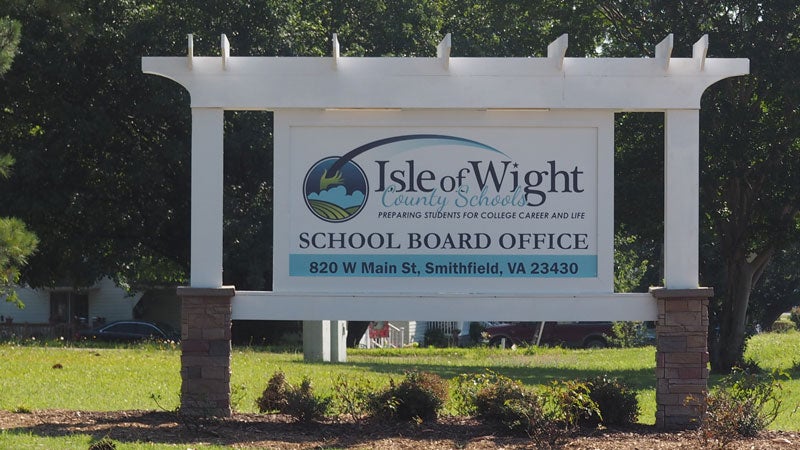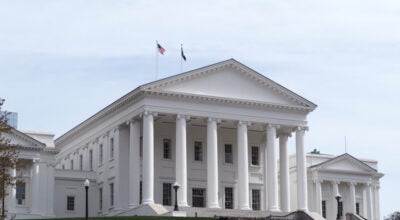Still united: Three Isle of Wight Methodist churches will stay with UMC amid denominational schism
Published 4:41 pm Monday, August 14, 2023

- The congregation of Trinity United Methodist Church, built in 1812, plans to remain affiliated with the UMC. Congregations that wish to leave the denomination have until Dec. 31 to do so if they wish to retain ownership of their church’s property. (Photo by Stephen Faleski | The Smithfield Times)
At least three Isle of Wight County congregations will remain affiliated with the United Methodist Church amid a growing national movement to split from the denomination.
At the heart of the schism is disagreement over the denomination’s stance on same-sex marriages and LGBT clergy.
Methodism’s Book of Discipline, or church law, has since 1972 deemed homosexuality “incompatible with Christian teaching,” and has prohibited clergy from officiating same-sex weddings or ordaining “self-avowed” LGBT pastors. At a 2019 special session of the General Conference, the denomination’s worldwide legislative body, the UMC reaffirmed its stance by a vote of 438-384, or 53%, and authorized a four-year window for churches wishing to disaffiliate “for reasons of conscience” to do so.
Trinity and Benn’s United Methodist Churches, the former located in the heart of downtown Smithfield and the latter a mile outside the town, have each decided to stay affiliated with the denomination, as has Woodland UMC, a congregation in a farming community roughly halfway between Smithfield and Windsor.
On March 15, Benn’s Church Council voted unanimously to remain with the UMC.
“We have no desire to leave,” said John Edwards, a longtime Benn’s congregant and retired Smithfield Times publisher, whom the Church Council selected as its spokesman regarding the schism.
According to Edwards, Benn’s sent out roughly 375 letters and received upward of 50 responses prior to the March vote, the majority in opposition to splitting from the UMC even if church law on sexuality changes at the next General Conference, set for April 23 through May 3.
“Benn’s is a very welcoming, embracing congregation; we welcome everyone,” Edwards said.
It’s much the same at Woodland, where, according to the Rev. Kay Carter, no one has expressed any desire to disaffiliate the congregation from the UMC.
“I have talked to some older folks who have grandchildren who are coming out as gay or transgender,” Carter said.
One of the traditions of Methodism, Carter said, is to “respect theological diversity,” noting that Methodism’s 18th century founder, John Wesley, once remarked: “Though we cannot think alike, may we not love alike? May we not be of one heart, though we are not of one opinion?”
Trinity’s congregation, according to its new pastor, the Rev. Dan Kim, has decided to remain in the UMC while waiting to see what, if any, church law changes result from the 2024 General Conference.
What’s at stake?
Congregations wishing to disaffiliate have until Dec. 31 to complete the process for retaining ownership of their church property.
“Local congregations hold the property of the church in trust for their respective Annual Conference,” Kim explained.
The United States has 54 annual conferences. The Virginia Conference comprises the majority of the state, though its southwestern tip is in the Holston Conference, which spans the Virginia-Tennessee border.
Churches wishing to disaffiliate must make a payment to the UMC that includes the cost of pensions as determined by determined by the investment firm Wespath, the legal fees to transfer property ownership, and two years worth of “apportionments,” a term that refers to funds contributed annually by Methodist churches to the worldwide missions of the UMC.
This payment, while hefty, is nominal compared to the value of the property disaffiliated churches would retain, Kim said.
Isle of Wight County’s most recent reassessment of property values estimated the worth of Trinity’s building and land at $4 million, though as a church it’s exempt from paying county real estate taxes.
According to the Virginia Conference’s website, 107 of its member churches had met the criteria for disaffiliation and had been ratified by the conference’s membership as of May 6. A two-thirds majority vote by a congregation is required to receive approval from the UMC to disaffiliate.
According to Virginia Conference spokeswoman Madeline White, no churches in Isle of Wight or Surry counties had disaffiliated as of May 6. Virginia, she said, will hold another conference on Oct. 7, at which time the count will be updated for a final time prior to the Dec. 31 deadline.
Bethany UMC, another Smithfield-area Methodist congregation, was still deciding as of June whether to stay or go, according to its pastor, the Rev. Chris Andress.
Riverview UMC in Carrollton, according to its website, also has over 100 years of history in the area, though church officials declined to comment on whether the congregation will remain in the denomination.
Uzzell UMC, located roughly 2 miles outside Smithfield, did not respond to a request for comments. Representatives of Oak Grove UMC, also in Carrollton, could not be reached for comments.
What happens to churches that leave?
Over 6,200 congregations nationwide had been approved by the UMC to disaffiliate as of Aug. 11, according to the United Methodist News Service’s unofficial tally of annual conference votes since 2019. The Virginia Conference saw 10 disaffiliations in 2022 and another 97 so far this year, according to the data.
The disaffiliations account for a fifth of Methodist congregations in the United States, according to Associated Press reporting.
The Rev. Keith Boyette of Spotsylvania County, a formerly eight-year member of the UMC’s Judicial Council, or “supreme court” equivalent, withdrew from the Virginia Conference last year and became the “transitional connectional officer” of a splinter denomination known as the Global Methodist Church, which officially launched May 1, 2022.
According to Boyette, 31 Virginia churches as of Aug. 9 had joined the GMC. Boyette, speaking to The Smithfield Times by phone the same day, described the GMC as “more theologically conservative” and “committed to historic Christianity.”
The UMC, he contends, has “migrated beyond historic Christian understanding.”
The GMC’s new member count is constantly in flux, as some churches make their decision to join the GMC before they officially disaffiliate from the UMC, and some wait until after they’ve disaffiliated, Boyette said.
The Virginia Conference voted in 2019 to call on the next General Conference to remove the language declaring homosexuality “incompatible with Christian teaching” from the Book of Discipline, and to encourage its bishops to delay any inquiry into clergy accused of being openly LGBT or officiating a same-sex wedding until after the General Conference.
According to Andress, churches that disaffiliate from the UMC have the option of joining another denomination, and not necessarily the GMC, or becoming an independent church. Those that join the GMC are typically what he and others have called “traditionalist” congregations that favor keeping the Book of Discipline’s current prohibition against same-sex weddings and openly LGBT clergy.
Another group he and others have called “compatibilists” want to stay in the UMC regardless of any changes to church law on sexuality.
A third group called “progressives” has for over 40 years pushed to change the UMC’s stance on same-sex marriage and LGBT clergy. They too have the option of separating from the denomination.
According to Edwards, one advantage in remaining with the UMC is continued membership in the United Methodist Committee on Relief, or UMCOR, an international humanitarian relief organization.
UMCOR, according to its website, provides relief and long-term recovery grants when natural or human-caused disasters overwhelm a community’s ability to recover on its own. Congregations that break away, Edwards contends, won’t have the same international financial resources to do the same.





